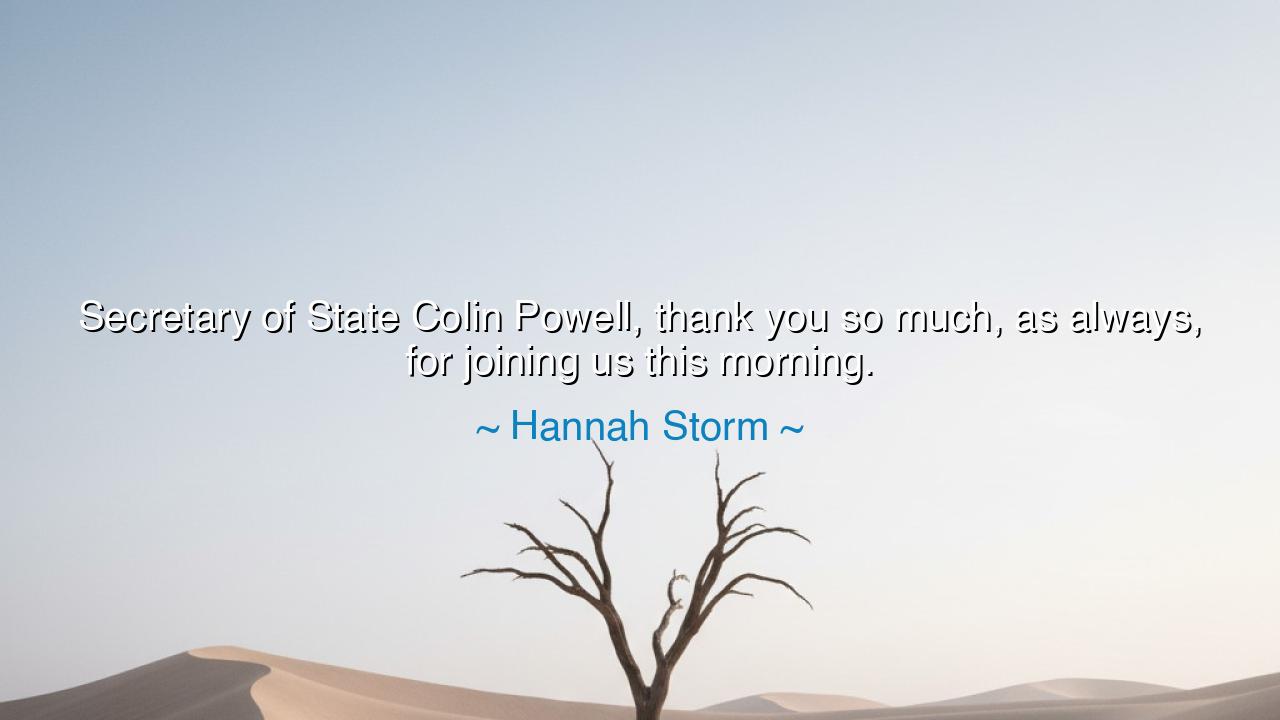
Secretary of State Colin Powell, thank you so much, as always
Secretary of State Colin Powell, thank you so much, as always, for joining us this morning.






The words of Hannah Storm, though simple in their form—“Secretary of State Colin Powell, thank you so much, as always, for joining us this morning”—are more than polite exchange. They remind us of the sacred power of gratitude, of recognition, and of the bond between those who speak and those who serve. Beneath the surface of a morning interview lies the eternal lesson: that to acknowledge another’s presence with respect is to strengthen the fabric of trust and fellowship.
She begins with the title Secretary of State, which carries with it the weight of service and responsibility. By naming him thus, she does not address merely the man, but the office, the years of labor, the burden of representing a nation before the world. To utter the name with honor is to remind all who hear that service is not lightly undertaken, and that those who bear great responsibilities deserve to be recognized with dignity. In this small act of speech, the ancient custom of honoring roles and duties is preserved.
The words “thank you so much” carry more than courtesy; they carry humility. Gratitude has always been the mark of the wise. Kings who forgot to thank their soldiers often lost their thrones, while leaders who remembered to honor those who stood with them inspired loyalty that outlived their reigns. Storm’s expression of thanks is a reminder that gratitude is not weakness, but strength—a force that binds people together, whether in the halls of power or in the quiet chambers of daily life.
History itself gives us countless examples. Consider Abraham Lincoln, who in the midst of the Civil War often took time to thank ordinary soldiers and weary generals alike. His handwritten letters of appreciation became treasures for those who received them, because they showed that even in chaos he did not forget the humanity of those around him. So too does Storm, in a simple phrase, honor not only Colin Powell’s words, but the man himself, reminding us that acknowledgment breathes life into duty.
The phrase “as always” suggests constancy. It reminds us that this was not the first time Powell lent his voice, nor the last, but part of an ongoing service. In ancient times, the presence of trusted advisors, priests, or generals was prized not only for their wisdom but for their reliability. To know that one could call upon them “as always” was to find comfort in stability. In this, the quote reveals another eternal truth: greatness is not built on one grand act, but on repeated acts of faithfulness.
The mention of “this morning” also holds meaning. Morning is the time of beginnings, when clarity is sought and direction is set. To have the counsel of a statesman at the dawn of the day is symbolic of the way wisdom must guide us at the start of every endeavor. Just as the sun’s rising marks a new path across the sky, so does guidance at the morning hour light the way for choices yet to be made.
The lesson for us, then, is this: honor those who stand beside you, give thanks for their presence, and value the constancy of their service. Whether in great halls or in simple homes, to speak words of recognition is to sow trust, and to give gratitude is to reap loyalty. We must remember that those who carry burdens for the good of others deserve not only to be heard but also to be thanked.
Thus, the simple words of Hannah Storm become a teaching for the generations: do not pass by those who serve without acknowledgment; do not receive wisdom without gratitude; do not forget the constancy of those who return again and again to offer their strength. For in such acts of recognition, we build not only respect, but the foundation of communities and nations that endure.






AAdministratorAdministrator
Welcome, honored guests. Please leave a comment, we will respond soon